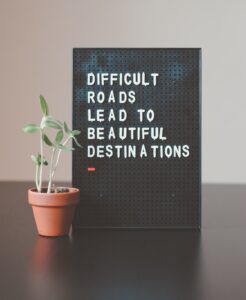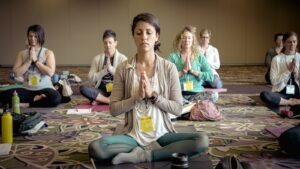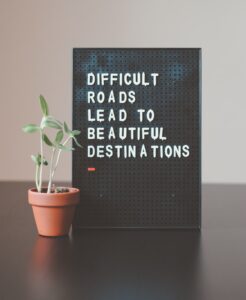TL;DR:
– Minimalist Lifestyle: Simplify for Well-being” unveils the essence and benefits of Minimalism, guiding readers on a transformative journey towards a clutter-free existence.
– Harnessing Minimalism entails understanding its principles, which transcend possessions to enrich mental health and sustainability while dispelling common myths.
– Embrace Minimalism to streamline your life by decluttering physical spaces, simplifying routines, and fostering mindful consumption habits.
– Witness the impact of Minimalism on relationships, social dynamics, and professional productivity through efficient task management and digital decluttering.
Introduction
Embracing a minimalist lifestyle can unlock a plethora of benefits for your well-being, ushering in tranquility amidst our fast-paced world. This approach isn’t just about decluttering your physical spaces. It extends deeper into simplifying your thoughts, commitments, and relationships to cultivate internal harmony. Having navigated this journey myself and guided many others, I am eager to share five powerful ways to raid your life of excess and experience the liberating power of simplicity. Come explore the uncluttered path to self-improvement and well-being. Let the minimalist lifestyle become your doorway to a more mindful existence.
What Does it Mean to Have a Minimalist Lifestyle?
The essence of a minimalist lifestyle is not merely about owning fewer material possessions. It is a mindset encompassing every facet of life, from physical spaces to mental clarity, centered around living with less to make room for more meaningful things. This lifestyle embraces the principle of “less is more.”
Understanding the Principles of Minimalism
Minimalism is not self-sacrifice or deprivation. It’s about focusing on what genuinely matters and eliminating the superfluous. Crucial principles include simplicity, intentionality, and clarity. A minimalist seeks to remove not only physical clutter but also habits, relationships, and activities that consume time without adding value, thus maximizing joy and fulfillment. Powerfully, BecomingMinimalist notes that the journey isn’t about achieving a perfect state, but making ongoing conscious choices for the kind of life you want.
Impact of Minimalism on Individual Lifestyle
A minimalist lifestyle brings about profound benefits both tangible and intangible. It can redefine your perception of success and happiness by discarding consumerism’s pressures. Moreover, it promotes mindfulness and intentional living, empowering you to take control of your life, reduce stress, and achieve personal growth.
Common Misconceptions about Minimalism
Contrary to misconceptions, minimalism is not about living a sparse, severely frugal life, and it’s not a one-size-fits-all prescription. There is no “right” or “wrong” way to practice it. The diversity in minimalist practices, as extensively detailed on TheMinimalists.com, attests to its flexibility and adaptability to individual needs and preferences. Furthermore, adopting a minimalist lifestyle does not suggest that you must reject all material possessions or comforts. Rather, it advises discerning judiciously what enhances life and what detracts from it.
Why Should You Adopt a Minimalist Lifestyle?
While the idea of living a minimalist lifestyle might seem daunting at first, it offers numerous benefits that can enhance your overall well-being. The minimalist lifestyle transcends the concept of merely owning fewer possessions – it’s about prioritizing what really matters to you.
Benefits of Living With Less
The most apparent benefit of practicing minimalism is the liberation from the overwhelming influence of material possessions. Here’s how it can positively impact your life:
- Financial Freedom: Less desire for material possessions results in fewer expenses and increased savings.
- More Time: With fewer possessions to manage, you give yourself the gift of time, which can be invested in meaningful activities.
- Increased Self-confidence: Less clutter means fewer distractions, helping boost focus and overall productivity.
For further inspiration, check out The Minimalists’ personal stories about how embracing minimalism has improved their lives.
Effects Of Minimalism On Mental Health
Embracing minimalism also benefits mental health, promoting inner peace and reducing stress. Here’s how:
- Reduced Anxiety: Less clutter can result in less stress, helping to lower levels of anxiety.
- Better Focus: Fewer distractions allow for better concentration and productivity.
- Elevated Mood: A clean, decluttered living space promotes positivity and higher energy levels.
Renowned psychologist Sherrie Bourg Carter explains further how an organized space can improve mental wellbeing.
How Minimalism Contributes To Sustainable Living
Minimalism naturally promotes sustainable living, as owning fewer things tends to reduce our carbon footprint. More mindful consumption means less waste generated, lesser energy consumption, and overall a more environmentally friendly approach to life. This way, minimalism not only benefits us individually, but also contributes to the wellbeing of our planet. For more information on sustainable living, Earth Easy offers great resources.
How to Start Your Journey Towards Minimalism?
Embracing a minimalist lifestyle might seem a daunting task, but it’s a journey that unfolds step by step. It starts with decluttering your physical space, simplifying daily routines, and adopting mindful consumption habits.
Decluttering your Physical Spaces: Where and How to Start?
Decluttering is a crucial first step towards minimalism. Begin with your living spaces; dispose items you rarely use. Less clutter means less stress and more space to breathe and think. ‘The KonMari Method’ by Marie Kondo, an internationally renowned organizing consultant, delivers effective decluttering strategies. The key is discarding items that do not ‘spark joy’, and organizing your space to bring future clutter under control.
Ways to Simplify Your Daily Routines
Simplifying routine involves reassessing your daily tasks. It could be as simple as reducing time spent on digital devices or planning meals ahead of time. Identify tasks that consume the most time and mental energy. Consider how they can be streamlined or eliminated. This idea finds echoes in Tim Ferriss’s well-known book, ‘The 4-Hour Workweek’, which espouses the philosophy of simplifying and automating tasks.
Adopting Mindful Consumption Habits
Minimalism isn’t solely about discarding; it’s about conscious and intentional consumption. It empowers you to make choices that have a positive impact on your wellbeing and the environment. It’s about buying less but buying better, as emphasized by Tara Button in her book ‘A Life Less Throwaway’. By adopting careful and mindful consumption habits, you reinforce your commitment to a minimalist lifestyle.
How Does Minimalism Affect Your Relationships and Social Life?
Minimalism, commonly associated with physical belongings and space decluttering, also has a profound impact on our relationships and social life. By adopting a minimalist lifestyle, one not only simplifies their physical environment but also their social sphere, leading to healthier, more meaningful relationships and a fulfilling social life.
Impact of Minimalism on Personal Relationships
Embracing a minimalist lifestyle often means re-evaluating the people in our lives and focusing on relationships that truly matter. This might involve reducing time spent with toxic or draining individuals and dedicating more time to relationships that add value to life. This notion is supported by research at Stanford University, indicating that quality of relationships trumps quantity in terms of well-being. Let’s delve deeper into how minimalism impacts personal relationships here.
Minimalism and Social Responsibilities
Minimalism is not just about decluttering physical spaces but also about rethinking one’s consumption habits. By being mindful of what we consume, we actively contribute to reducing waste and promoting sustainability, playing a part in a larger social responsibility. The minimalist ethos aligns with the United Nations’ Sustainable Development Goals, particularly responsible consumption and production. Learn more about the link between minimalism and sustainability here.
Navigating Societal Pressures While Living a Minimalist Lifestyle
Living a minimalist lifestyle in a society that often equates possessions with success can be challenging. However, minimalists argue that pushing back against societal pressures to consumerism leads to improved mental health and a more balanced life. This approach requires strength of mind to resist peer pressure and societal norms, instead opting for a life that aligns with personal values and well-being.
Can Minimalism Enhance Your Work Life and Professional Productivity?
The minimalist lifestyle does not stop at your doorstep; it extends to your professional life too. Adopting minimalism in your work life can substantially increase your productivity and reduce stress. Here is how you can incorporate minimalist principles to ensure a more efficient and balanced work life.
Minimalist Practices for Efficient Task Management
A simple, uncluttered workspace can help fuel creativity and boost efficiency. Utilizing tools like the Pomodoro Technique, which breaks work into intervals separated by short breaks, can enhance focus. Prioritizing tasks and eliminating unnecessary ones are also fundamental aspects of minimalist task management. For instance, simplifying communication by reducing meetings and emails can save considerable time.
Decluttering Your Digital Spaces for Productivity
Screen clutter can significantly hamper productivity. Use productivity apps and programmes to organize your digital files, remove old documents, and streamline your inbox. Consider also simplifying your digital space by limiting the number of tabs and windows open at any given time. Minimalism in digital spaces can improve concentration, increase your processing speed, and reduce feelings of overwhelm. Here’s how you can declutter your digital life.
Work-Life Balance in a Minimalist Lifestyle
Work-life balance, a major aspect of wellbeing, is closely intertwined with minimalism. By practicing minimalist principles, you can define your workday boundaries more clearly, eliminating unnecessary tasks and focusing only on what truly matters. This could result in less overtime work, and more quality time spent with family and friends. Investing in self-care and relationships can, contradictorily, lead to improved work performance as suggested by Mayo Clinic.
Next, we move on to concluding this discussion about Minimalism.
Conclusion:
In embracing a minimalist lifestyle, one can unlock a world of clarity, purpose, and well-being. By decluttering physical spaces, organizing thoughts, and prioritizing the essential, individuals can experience profound shifts in mental and emotional well-being. The five powerful strategies outlined in this article provide a roadmap to simplicity and fulfillment, guiding us towards a more intentional and balanced existence. As you delve deeper into the principles of Minimalist Lifestyle, discover how these transformative practices can revolutionize your life and nurture a deeper sense of peace and joy. Dive into our wealth of resources and unleash the power of minimalism in transforming your well-being.















